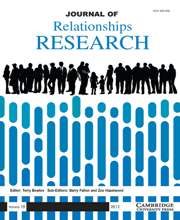Article contents
The Indirect Relationship Between Rumination, Shame And Depression: A Mediation Analysis for Those Experiencing Relationship Difficulties
Published online by Cambridge University Press: 23 February 2012
Abstract
Difficulties in intimate partner relationships are known to have detrimental effects on mental health. The association between relationship difficulties and depression is particularly strong for individuals with a tendency for rumination. While the link between rumination and depression has long been established, the indirect effects of shame and emotion regulation on this relationship remain less clear. The present study reports on longitudinal data of 65 participants (36 males) who had experienced recent relationship difficulties with their partner. Respondents provided Time 1 data for rumination (brooding and reflection), shame (personal feelings of shame) and relationship difficulties. Approximately 15 weeks later, Time 2 data was collected for emotion regulation (cognitive reappraisal, expressive suppression), relationship difficulties and depression. Mediation analyses with bias-corrected bootstrapping indicated that shame fully mediated the relationship between brooding and depression, and partially mediated the relationship between reflection and depression. The indirect effects remained significant with covariates (relationship difficulties at Time 1, and cognitive reappraisal and expressive suppression at Time 2). Results suggest that self-evaluations related to shame contribute to the relationship between rumination and depression, independent of affect regulation. Implications for the role of shame in relationship difficulties are discussed.
- Type
- Articles
- Information
- Copyright
- Copyright © Cambridge University Press 2011
- 4
- Cited by




